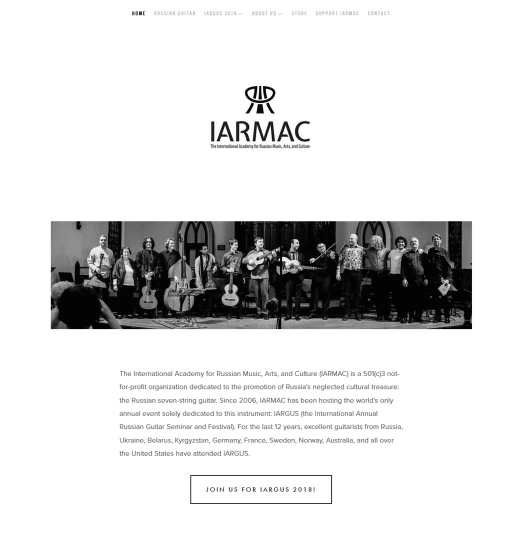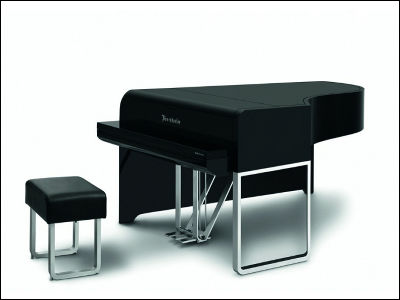The world center of the Russian traditional musical instrument '7 string guitar' exists in the state of Iowa in the United States

In Russia for a long time, his own instrument "7 string guitar" has been played. It is a seven-string guitar which was proud of high popularity around the 19th century, but now in the 21st century, the center of culture has moved to the state of Iowa in the USA.
How the Center of a Russian-Guitar Culture Ended Up in the American Midwest - Tablet Magazine
https://www.tabletmag.com/jewish-arts-and-culture/271918/seven-strings-over-iowa
If you hear "guitar" most people think of instruments with six strings stretched, but in Russia "7 string guitar" increased by 1 in bass strings has been played. Unique tone is spun out from 7 string guitar tuned to open G tuning (DGBDGBD) which is different from general guitar. From the following performance by Sergei Orekov, a master of the seven string guitar, you should feel the melancholy melody and the sound of the seventh string guitar.
Russian 7 string guitar - Sergei Orekhov - Moscow Polka - YouTube
Although it is a seven string guitar which can be said to be an old Russian culture, as a result of being touched by the change of the turbulent era, the center has moved to the state of Iowa in the USA. In Iowa, the international festival of the seven string guitar "The International Annual Russian Guitar Festival and Seminar" (IARGUS) has been held for 12 years since 2006.
Artists - IARMAC
https://www.iarmac.com/artists/

IARGUS is an event held by Russian guitarist Oleg Timofeiyev and others living in Iowa. Mr. Timo Fayev is one of the first citizens allowed to leave the USSR by Glasnost , an information policy forming a part of the reform movement Perestroika held in the Soviet Union during the Gorbachev era, that he moved to the state of Iowa in the USA Thing. It was Mr. Timo Fayef that the family was a musician, but when he was young he could not recognize the talent of music and he was supposed to be living his life as an architect.
Mr. Timo Fayev who was a Soviet person born in the family of the Jews said that he was expressing the feelings of rebellion against the Soviet government at that time with music. The Soviet Union of the time used music as one of the means of propaganda, especially the American music culture had a tough attitude. Regarding classical music as well, the aftermath has expanded, and seven string guitars and six string guitars that were recognized as "ethnic instruments" seem to have been excluded from the music school curriculum of those days.
Timo Fayeff who was enjoying playing with friends, he studied under the charismatic guitar player Camille, Arturovich Fraucci who was active at the time in parallel with going to math school. Mr. Timo Feiyev said that "Mr. Frauchi is an excellent teacher and the result immediately appears," but on the other hand, "In order to be a teacher of Mr. Frauchi, his theory and It was necessary to accept charisma.It was necessary to basically become his doll.I have learned so much but as I think at this point "I can not study this person anymore" It has been said. "

By Encyclopedia of Gitarmag
Mr. Timo Fayeff, who lost interest in guitar, took the wave of the old music "old music" that was emerging at the time, he said that he began playing the instrument " Lute " which is the predecessor of the guitar. Timo Fayef, who noticed that just changing the tuning of only one of the strings of the guitar can be played just like a lute will now begin to act as a lute player for a while.
However, the political system at that time added restrictions even to the performance of the lute. As the work composed for the lute has none of the composers from Russia and since the slavic culture is contained extensively, it is good that the era has not continued for the system side to admit to playing in the music world I will. Under the regime of the time, rock music was prohibited as "to bring in a decadent culture of the West", while the musician's music was "to bring in church music", and according to the system "antisocialistic Timo Fayev will look back when the time to be able to keep an eye on the two points of playing instruments playing music in the Renaissance and Baroque periods.
It may have been a kind of inevitability for Mr. Timo Fayev to look to the United States. Finding contacts that connect Iowa and Russia is not easy, but Timofeiyev cites "America's openness" about the reason. "Russian traditional music was about to be completely forgotten from" Mother Russia. "In that sense, the city of Iowa was the best destination, Americans are very open In Iowa residents have ears to enjoy good music.If you hold a guitar festival in Russia, a guitarist who is an international faction will say that "6 string guitar is better than 7 string guitar" "I will not have such a thing here in Iowa." I talked about America being the place where the 7th string guitar arrived.
Interestingly, it was the historical guitar player Andrés Segovia who told the Soviet Union the superiority of the 6-string guitar. Segovia has a credit to raise the guitar that has been regarded as "country instrument" to a class equivalent to piano and violin, but he seems to have shown a severe view towards the Soviet seven-string guitar. 1926, 7-month stay was Segovia in the Soviet Union to emphasize the superiority of the Spanish guitar is the birthplace of their own, a record that had continued to claims of "anti-7-string guitar" is has been left .

By Nationaal Archief
Timo Fayeff, who was tired of the music situation of the Soviet Union, said he tried unknown to continue music outside of the country. In such a time, Mr. Sven Hansel who came from the United States visited the former Timo Fayev and was impressed with the "deep Russian soul" put in the performance, so I went to the University of Iowa with Timofeiyev I made an offer to invite.
Timo Fayeff who went to the United States in 1989 after receiving an attractive offer but was actually assigned a room without an air conditioner and received an extension of visa as Mr. Hansel's assistant, but after several months He said that he received correspondence such as unlocking the position of the assistant. Mr. Timo Fayeff later got acquainted with his wife Sabine Gertz and received a master's degree in old music from the University of Southern California who received a scholarship in 1993. In 1995 I acquired a permanent residence qualification green card and in 1999 I am going to acquire my PhD in Duke University.
Timofeiyev who enjoyed the research life in the United States, but as if it became inversely proportional to it, the interest in Russia and its music came to be strengthened. After acquiring the green card, Mr. Timo Fayeff returned to Moscow for the first time in ten years to find the theme of the thesis. In Russian academic circles it was Timofeiyev who was opposed from Russian friends, etc. "It is not good to think about career" about researching the seven string guitar at the lower position of the hierarchy in the academic circle of Russia, He seems to have decided to have a 7 string guitar as a theme.
Timo Fayeff, who returned to Iowa State, proposed to establish a course of Russian research for the university and will continue to work as a musician outside the university. My wife, Mr. Gertz, proposed the establishment of a nonprofit organization "The International Academy for Russian Music, Arts, and Culture" (IARMAC), and in 2006 the above-mentioned seven-string guitar festival "IARGUS" began and reached the present It is.
IARMAC
https://www.iarmac.com/

Related Posts:







